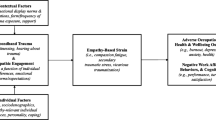Abstract
Recent research is advancing in the analysis of the defusion and self-based exercises used in acceptance and commitment therapy (ACT) through relational frame theory (RFT) terms. This study aimed to analyze the effect of two RFT-defined defusion protocols in promoting psychological flexibility by altering the discriminative functions of avoidance of aversive private events. Thirty participants first responded to several questionnaires. Subsequently, participants were exposed to 2 experimental tasks (pretest): a cold pressor and an aversive film. Participants were then randomly assigned to 3 experimental conditions: (a) a control condition, (b) a defusion protocol based on framing one’s own behavior through deictic relations (Defusion I), and (c) a defusion protocol that also included hierarchical relations and giving regulatory functions to that discrimination (Defusion II). Finally, participants were again exposed to the 2 experimental tasks (posttest). Results showed that participants who received the defusion protocols performed better in the posttest than did the control participants, and that Defusion II participants showed higher tolerance than Defusion I participants.



Similar content being viewed by others
References
Antony, M. M., Bieling, P. J., Cox, B. J., Enns, M. W., & Swinson, R. P. (1998). Psychometric properties of the 42-item and 21-item versions of the Depression Anxiety Stress Scales (DASS) in clinical groups and a community sample. Psychological Assessment, 10, 176–181. doi:10.1037/1040-3590.10.2.176.
Barnes-Holmes, Y., Barnes-Holmes, D., McHugh, L., & Hayes, S. C. (2004). Relational frame theory: Some implications for understanding and treating human psychopathology. International Journal of Psychology and Psychological Therapy, 4, 355–375.
Bond, F. W., Hayes, S. C., Baer, R. A., Carpenter, K. M., Guenole, N., Orcutt, H. K., … Zettle, R. D. (2011). Preliminary psychometric properties of the Acceptance and Action Questionnaire–II: A revised measure of psychological inflexibility and experiential avoidance. Behavior Therapy, 42, 676–688. doi:10.1016/j.beth.2011.03.007
Cohen, J. (1988). Statistical power analysis for the behavioral sciences (2nd ed.). Hillsdale: Erlbaum.
Daza, P., Novy, D. M., Stanley, M., & Averill, P. (2002). The Depression Anxiety Stress Scale–21: Spanish translation and validation with a Hispanic sample. Journal of Psychopathology and Behavioral Assessment, 24, 195–205. doi:10.1023/A:1016014818163.
Foody, M., Barnes-Holmes, Y., Barnes-Holmes, D., Rai, L., & Luciano, C. (2015). An empirical investigation of the role of self, hierarchy, and distinction in a common act exercise. The Psychological Record, 65, 231–243. doi:10.1007/s40732-014-0103-2.
Foody, M., Barnes-Holmes, Y., Barnes-Holmes, D., & Luciano, C. (2013). An empirical investigation of hierarchical versus distinction relations in a self-based ACT exercise. International Journal of Psychology and Psychological Therapy, 13, 373–385.
Gillanders, D. T., Bolderston, H., Bond, F. W., Dempster, M., Flaxman, P. E., Campbell, L., … Remington, B. (2014). The development and initial validation of the Cognitive Fusion Questionnaire. Behavior Therapy, 45, 83–101. doi:10.1016/j.beth.2013.09.001
Gutiérrez, O., Luciano, C., Rodríguez, M., & Fink, B. C. (2004). Comparison between an acceptance-based and a cognitive-control-based protocol for coping with pain. Behavior Therapy, 35, 767–783. doi:10.1016/S0005-7894(04)80019-4.
Hayes, A. F. (2013). Introduction to mediation, moderation, and conditional process analysis. A regression-based approach. New York: Guilford Press.
Hayes, S. C., Barnes-Holmes, D., & Roche, D. (Eds.). (2001). Relational frame theory: A post-Skinnerian account of human language and cognition. New York: Plenum Press.
Hayes, S. C., Luoma, J. B., Bond, F. W., Masuda, A., & Lillis, J. (2006). Acceptance and commitment therapy: Model, processes and outcomes. Behaviour Research and Therapy, 44, 1–25. doi:10.1016/j.brat.2005.06.006.
Hayes, S. C., Strosahl, K. D., & Wilson, K. G. (1999). Acceptance and commitment therapy. An experiential approach to behavior change. New York: Guilford.
López, J. C., Ruiz, F. J., Feder, J., Barbero-Rubio, A., Suárez-Aguirre, J., Rodríguez, J. A., & Luciano, C. (2010). The role of experiential avoidance in the performance on a high cognitive demand task. International Journal of Psychology and Psychological Therapy, 10, 475–488.
Luciano, C., Ruiz, F. J., Vizcaíno-Torres, R. M., Sánchez-Martín, V., Gutiérrez-Martínez, O., & López-López, J. C. (2011). A relational frame analysis of defusion interactions in acceptance and commitment therapy: A preliminary and quasi-experimental study with at-risk adolescents. International Journal of Psychology and Psychological Therapy, 11, 165–182.
Luciano, C., Valdivia-Salas, S., Cabello, F., & Hernández, M. (2009). Developing self-directed rules. In R. A. Rehfeldt & Y. Barnes-Holmes (Eds.), Derived relational responding: Applications for learners with autism and other developmental disabilities (pp. 335–352). Oakland: New Harbinger.
Luciano, C., Valdivia-Salas, S., & Ruiz, F. J. (2012). The self as the context for rule-governed behavior. In L. McHugh & I. Stewart (Eds.), The self and perspective taking: Research and applications (pp. 143–160). Oakland: Context Press.
Ruiz, F. J., Langer, A. I., Luciano, C., Cangas, A. J., & Beltrán, I. (2013). Measuring experiential avoidance and psychological inflexibility: The Spanish translation of the Acceptance and Action Questionnaire. Psicothema, 25, 123–129. doi:10.7334/psicothema2011.239.
Ruiz, F. J., & Luciano, C. (2015). Common physical properties among relational networks improve analogy aptness. Journal of the Experimental Analysis of Behavior, 103, 498–510. doi:10.1002/jeab.147.
Ruiz, F. J., Luciano, C., Vizcaíno-Torres, R. M., & Sánchez, V. (2012). Aplicación de la terapia de aceptación y compromiso (ACT) en trastornos de ansiedad en la infancia. Un caso de fobia a la oscuridad [Application of acceptance and commitment therapy (ACT) in children with anxiety disorders: A case study of darkness phobia]. In M. Páez & O. Gutiérrez (Eds.), Múltiples aplicaciones de la terapia de aceptación y compromiso [Multiple applications of acceptance and commitment therapy] (pp. 27–44). Madrid: Pirámide.
Ruiz, F. J., & Perete, L. (2015). Application of a relational frame theory account of psychological flexibility in young children. Psicothema, 27, 114–119. doi:10.7334/psicothema2014.195.
Ruiz, F. J., Suárez-Falcón, J. C., Riaño-Hernández, D., & Gillanders, D. (2017, in press). Psychometric properties of the Cognitive Fusion Questionnaire in Colombia. Revista Latinoamericana de Psicología.
Törneke, N. (2010). Learning RFT: An introduction to relational frame theory and its clinical applications. Oakland: Context Press.
Törneke, N., Luciano, C., Barnes-Holmes, Y., & Bond, F. (2016). RFT for clinical practice: Three core strategies in understanding and treating human suffering. In R. D. Zettle, S. C. Hayes, D. Barnes-Holmes, & A. Biglan (Eds.), The Wiley handbook of contextual behavioral science (pp. 254–273). New York: Wiley Blackwell.
Villatte, M., Villatte, J. L., & Hayes, S. C. (2016). Mastering the clinical conversation: Language as intervention. New York: Guilford Press.
Author information
Authors and Affiliations
Corresponding author
Ethics declarations
Ethical approval
All procedures performed in this study were in accordance with the ethical standards of the institutional and/or national research committee and with the 1964 Helsinki Declaration and its later amendments or comparable ethical standards.
Conflict of Interest
The authors declare that they have no conflict of interest.
Informed consent
Informed consent was obtained from all individual participants included in the study.
Funding
This study was supported, in part, by funds from the research projects PSI2011-25497 (Ministerio de Ciencia e Innovación) and PSI2014-59610-P (Ministerio de Economía y Competitividad).
Rights and permissions
About this article
Cite this article
Gil-Luciano, B., Ruiz, F.J., Valdivia-Salas, S. et al. Promoting Psychological Flexibility on Tolerance Tasks: Framing Behavior Through Deictic/Hierarchical Relations and Specifying Augmental Functions. Psychol Rec 67, 1–9 (2017). https://doi.org/10.1007/s40732-016-0200-5
Published:
Issue Date:
DOI: https://doi.org/10.1007/s40732-016-0200-5




